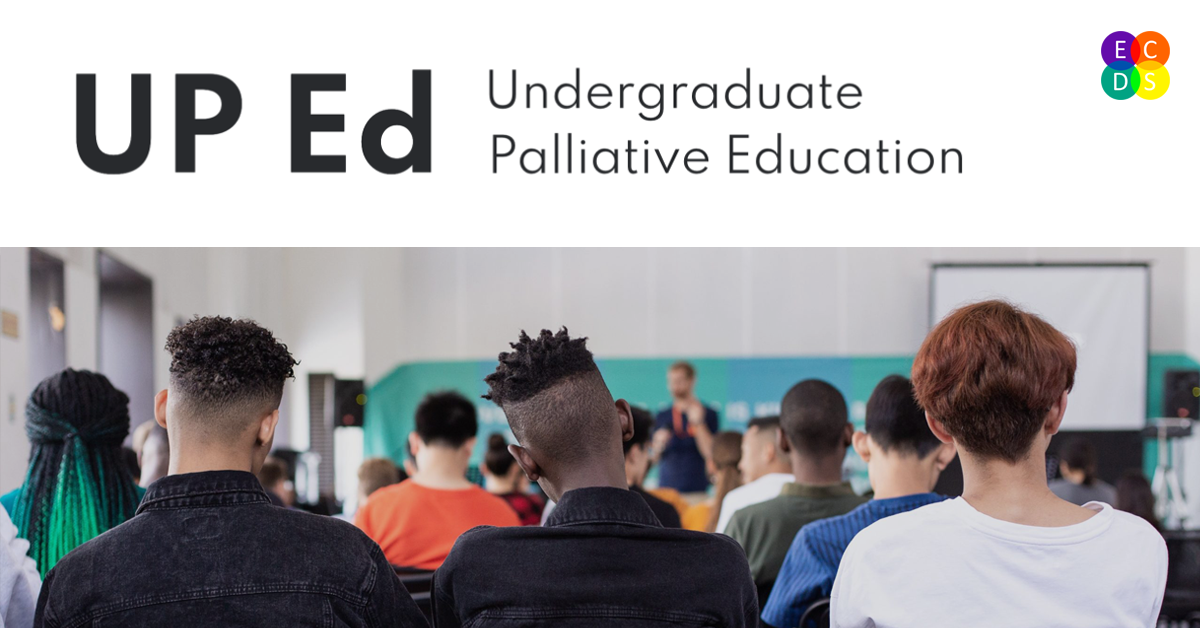The Emory Center for Digital Scholarship (ECDS) has recently aided in the creation of the Undergraduate Palliative Education (UP Ed) portal, a multidisciplinary collaboration to help undergraduates engage with profound human issues, such as grief, loss, suffering, and dying. UP Ed began at Emory University in 2019 and now encompasses ten partner universities working across the country to teach palliative care principles to undergraduates from an array of disciplines. ECDS Digital Scholarship Specialist Dr. Kayla Shipp helped develop a website for the project, whose mission is to “influence the next generation to build a humanistic approach to their professions with an early understanding of palliative care from a number of perspectives.”
As the website mission page states, UP Ed (funded by the Arthur Vining Davis Foundations) “brings together palliative clinicians and researchers with undergraduate educators in a broad range of disciplines – sociology, ethics, classics, history, philosophy, and beyond. Through guest lectures, seminar courses, campus events, and other activities, faculty and students work together to broaden undergraduates’ exposure and perspectives on complex issues such as grief, loss, suffering, and dying.” During the 2020 academic year, palliative care faculty presented in undergraduate sociology, bioethics, history of medicine, and other courses. Undergraduate faculty in sociology, psychology, history, and other disciplines added palliative material to courses on death and dying, philosophy of science, and ancient Greek literature.
The UP Ed team approached ECDS to develop the program’s online home, which would serve as a public-facing hub and an internal portal for consortium members to share resources with one another. The main goals of the project were to build a space that would educate unaffiliated faculty on the importance of undergraduate palliative education and encourage them to join the consortium. The UP Ed portal also houses an accessible collection of slides, syllabi, readings, and video lectures for affiliated faculty to use in their own courses.
 Central to the site is the collaborative resources page where faculty users can sort resource content by topic or category (readings, lecture slides, syllabi, in-class exercises, and video lectures) depending on their particular needs. The inaugural resource collection includes everything from a recorded lecture about teaching children about death and dying given by docents at the Michael C. Carlos Museum, to an in-class activity that engages students to think critically about the length of hospice stay. Each resource is password-protected and licensed under a creative commons license, making it easy for consortium partners to download and share their tools and methods.
Central to the site is the collaborative resources page where faculty users can sort resource content by topic or category (readings, lecture slides, syllabi, in-class exercises, and video lectures) depending on their particular needs. The inaugural resource collection includes everything from a recorded lecture about teaching children about death and dying given by docents at the Michael C. Carlos Museum, to an in-class activity that engages students to think critically about the length of hospice stay. Each resource is password-protected and licensed under a creative commons license, making it easy for consortium partners to download and share their tools and methods.
The project team wanted to emphasize the function of the site as an undergraduate educational tool, to distinguish it from existing sites focused on palliative care resources for patients. They chose a design and images that emphasize a campus learning environment. They intentionally avoided health-related images to affirm the role of the humanities, social sciences, and other disciplines as venues in which students engage with themes of illness, suffering, and death.

The consortium’s goal is for faculty to continue adding to resources to the portal, with the hope that the site will spark conversations and ideas for developing new content as well. To help educate users about the importance about palliative care education, the site includes an FAQ section addressing common questions about the field and a news page to keep current and potential partners up to date about consortium activities. The portal will form a key part of the consortium’s mission to influence and educate students from a variety of disciplines entering an array of professions, helping them develop a humanistic approach to their work through their relationship to palliative care principles.
“We are thrilled at the response from students and faculty alike,” says Dr. Tammie Quest, Division Chief of Palliative Medicine at Emory (and member of UP Ed’s core Emory team). “Loss and meaning-making are universal human experiences, and the past year has demonstrated how important and necessary it is to communicate about them at all stages of development.” Dr. Jane Lowers, an instructor and research in the Division of Palliative Medicine, adds that the website helps illustrate the point that, as a field, “palliative care is always working to reinforce the concept of addressing suffering at any stage of illness, not just end of life.”
To contact the UP Ed team, submit resources for the website, and/or learn how to get involved, please visit:

